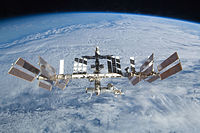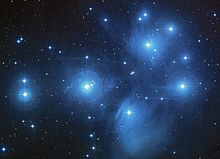- Portal:Space
-
The Space Portal
Main Featured content Things you can do Topics Introduction
Space, (or outer space), describes the vast empty regions between planets and stars. The study of these, and other, astronomical objects is called Astronomy, one of the oldest sciences. It is often said that space exploration began with the launch of Sputnik 1, the first man-made object to orbit the Earth. Then, in an almost unbelievable feat of human achievement, in 1969 Neil Armstrong and Buzz Aldrin travelled to the Moon and set foot on the surface during the Apollo 11 mission. Recently, it has become clear that the possibility of space colonization may no longer be exclusively reserved for science-fiction stories, and many controversial issues surrounding space have come to light, including commercial spaceflight, space laws and space weapons.
Selected article
 ISS after STS-128 undocked on September 9, 2009
ISS after STS-128 undocked on September 9, 2009
The International Space Station (ISS) is an internationally developed research facility that is being assembled in low Earth orbit. On-orbit construction of the station began in 1998 and is scheduled for completion by late 2011. The station is expected to remain in operation until at least 2015, and likely 2020. With a greater mass than that of any previous space station, the ISS can be seen from Earth with the naked eye, and is by far the largest artificial satellite that has ever orbited Earth. The ISS serves as a research laboratory that has a microgravity environment in which crews conduct experiments in biology, chemistry, human biology, physics, astronomy and meteorology. The station has a unique environment for the testing of the spacecraft systems that will be required for missions to the Moon and Mars. The ISS is operated by Expedition crews, with the station programme maintaining an uninterrupted human presence in space since the launch of Expedition 1 on 31 October 2000, a total of 11 years and 21 days. The programme is thus approaching the current record, set aboard Mir, of 3,644 days (8 days short of 10 years), with the ISS expected to take the record on 23 October 2010. As of 1 June 2010[update], the crew of Expedition 24 is aboard.
Read more... Selected picture
The Pleiades (also known as M45 or the Seven Sisters) is an open cluster in the constellation of Taurus. It is among the nearest to the Earth of all open clusters, probably the best known and certainly the most striking to the naked eye. Color-composite image of the Pleiades from the Digitized Sky Survey
Color-composite image of the Pleiades from the Digitized Sky Survey
Space news
Wikinews Space Portal- September 10: Out of space in outer space: Special report on NASA's 'space junk' plans
- August 18: SETI Institute set to re-open
- August 9: DNA components found in meteorites
- August 6: Juno spacecraft bound for Jupiter
- July 22: Space Shuttle Atlantis landing concludes program
- July 8: End of an era: Space Shuttle Atlantis launches on final mission in program
- July 8: Cassini spacecraft captures large storm on Saturn
- July 1: U.S. space agency NASA sues ex-astronaut
- June 29: Debris narrowly misses International Space Station
- June 23: Saturn moon Enceladus may have salty ocean
- June 17: Study says young stars 'shoot water bullets'
- June 4: Space Shuttle Endeavour enters history books after nineteen years following penultimate landing of program
Upcoming spaceflight launches
The next scheduled launch is of six Globalstar-2 satellites on a Soyuz-2.1a/Fregat, scheduled for 02:27 13 July 2011. - For a full launch schedule see 2011 in spaceflight
Astronomical events in November 2011
- All times UT unless otherwise specified.
8 November, 13:07 Moon at apogee 8 November, 23:42 Asteroid 2005 YU55 close approach to Earth 10 November, 20:16 Full moon 14 November, 08:42 Mercury at greatest eastern elongation 18 November, 04:00 Leonids peak 23 November, 23:14 Moon at perigee 25 November, 06:20 New moon and partial solar eclipse Astronomy Star Spaceflight Space Solar System Mars Purge server cache Categories:- Physical science portals
- Astronomy portals
Wikimedia Foundation. 2010.





